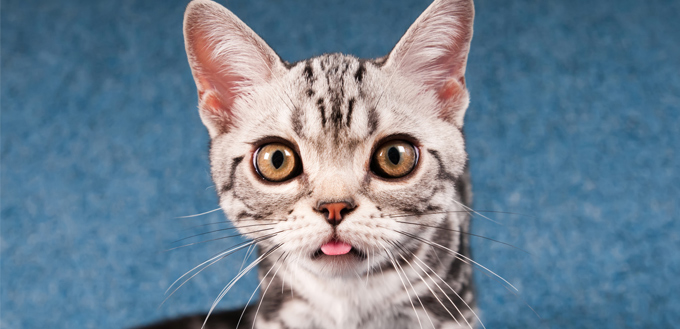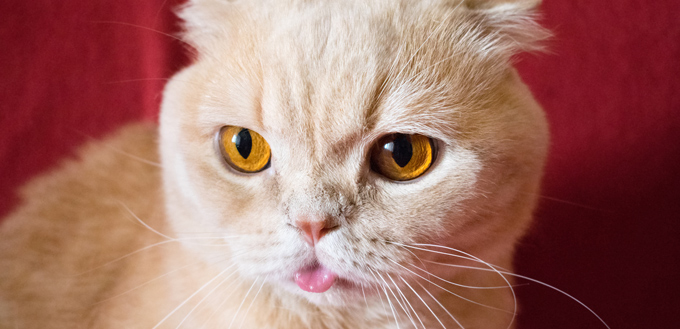The term ‘blep’ may not have made it into the scientific literature yet but it has become one of the latest social media fads. As with many new words and phrases, no-one is entirely sure when or where the term was first used or by who. What we do know, is that it describes an animal, usually a kitty, sticking out the tip of their tongue for quite a while. If you have a quick internet search using the term ‘blep’ you’ll get inundated by cute photos of cats looking a little confused and sticking their little pink tongues out. Other animals have got in on the act and you’ll also find pictures of dogs, horses and even tigers doing a blep!
So, why do cats blep?

The Science Behind the Blep
There are several reasons why your kitty may be sticking out their tongue. Science has a few possible theories.
The ‘Stray Hair’ Theory
Cats use their tongues for eating, drinking, grooming and generally staying healthy. You will have noticed that when your kitty licks you, their tongue feels very rough. This is because it is covered in tiny barbs called papillae. They curve backward and help the tongue to draw food and liquid up into the mouth and to remove dead hairs and dirt from their coat. Cats are very keen to remove every last trace of food from their coat because, in the wild, the odor would have attracted predators.
The papillae do their job well but the hairs or dirt that they have collected can get stuck on the tongue. This is an unpleasant feeling for a cat – a bit like how we feel when we get a hair stuck in our mouths. The difference is that we can reach into our mouths and pull the hair off our tongue but a cat obviously can’t. Therefore, they try to shift it by flicking their tongue out. When you catch them at it with your smartphone, it’s a kitten blep!
The ‘Forgot to Put it in’ Theory
Did you disturb your cat in the middle of an eating or grooming session? They may have looked up at you and failed to retract their tongue completely. It usually only lasts a few seconds but if you’re quick you can catch a picture.
Cats are usually extremely dignified and it’s very funny to catch them off-guard.
The ‘Tasting the Air’ Theory
Cats use all of their senses to explore the environment around them. They like to ‘taste’ the air. They do this using the ‘Flehmen response’ which involves opening the mouth and putting out the tongue so that they can collect air-borne pheromones from other cats onto it. They then transfer them to the roof of their mouth where there is an organ that can interpret scents. It’s called the vomeronasal organ.
They can get all sorts of information about other cats in the area including whether they are male or female, in season etc. If they have left their tongue out for a while, they may have got carried away reading all the ‘cat messages’!
The Missing Teeth Theory
Because of the way that a cat’s mouth is shaped, they need their teeth to keep their tongue in place. Therefore, if your cat has lost a tooth, their tongue is more likely to flop out. Also, some breeds are more likely to blep because they have a flatter face. Persians are frequent blepers because there is little room inside their mouths to fit the tongue back in.
The Relaxed Theory
When cats are completely relaxed, they slacken their jaw and the tip of the tongue can fall out of the front of the mouth. A blep on an adorable kitten makes an especially cute photograph. This is just a perfectly normal sleeping position and is often seen at the same time as involuntary twitching.
If your kitty is taking a muscle-relaxing medication for a medical issue such as stress, you may notice that they kitten blep more often.

When a Blep Is Something to Be Worried About
Sometimes a blep is not just a cute little kitty quirk. It is a sign that your cat is ill. Here are a few medical problems that could cause a blep in your cat.
- Dementia
In older cats, the inability to keep the tongue inside the mouth can be a sign of dementia. It will be accompanied by other signs such as staring at walls, persistent crying, agitation, decreased appetite and failing to use the litter tray correctly. If you are concerned that your older cat has dementia, you should book an appointment with your vet.
- Periodontal disease
This is the medical name for gum disease. It can cause a cat to drool excessively and to have their tongue hanging out. You may also notice bleeding in the mouth and your cat may avoid chewing or may appear to be in pain. Periodontal disease starts as a build-up of plaque but can quickly progress to bone and tissue destruction and pus formation in the cavities between the gum and teeth. It is the most common disease to affect cats in the US. It can affect cats of all ages. Take your kitty to the vet right away if you notice these symptoms because they may need professional cleaning and polishing, a fluoride application or even surgery. You can prevent it by regularly brushing your cat’s mouth and gums.
- Feline Stomatitis
This is a rare but serious feline health condition. It is a type of inflammation of a cat’s mouth and gums. There will usually be ulcers in the mouth but there could also be ulceration of the back of the throat as well as the lips and tongue. You may also notice that your cat’s coat is looking in poor condition (because they cannot groom it), they are refusing to eat (and therefore losing weight) and have bad breath. Some cats also show discomfort by pawing at their face or mouth.
It can affect cats of all ages and all breeds. The cause is often dental disease but it can also be triggered by immune-mediated conditions where a cat’s own immune system destroys its own tissues as it is responding to pathogens in the mouth. Other medical conditions associated with feline stomatitis are viral infections (including calcivirus and feline leukemia virus (FeLV))and bartonellosis. If you suspect that your cat has this condition, it is important to consult a vet because long-term treatment is often required.
- Heatstroke
Cats can suffer from heatstroke if they are exposed to excessive heat and do not have enough water. This is most likely to happen in a car. It is never acceptable to leave a cat in a car on a hot day. A cat with heat stroke will have a very red tongue and will drool and pant. They may also lose their balance. Because cats are homeotherms, their body temperature does not change very much and is a constant 101 or 102 degrees Fahrenheit.
If your cat is sticking out their tongue to try to regulate their temperature, they are already too hot. This should have been prevented by giving them access to shade and fresh water. Elderly cats, obese cats and flat-faced breeds like the Himalayan which also have long hair are more susceptible to heatstroke. A cat with heatstroke needs to be cooled down gradually and taken to a vet.
- Motion sickness
Many cats suffer from motion sickness and some will vomit when they travel in cars. Others, stick out their tongues but this is usually accompanied by drooling and panting. Sometimes it is the motion of the car that affects your cat and makes them feel dizzy. For other cats, the nausea is triggered by anxiety because the car is unfamiliar to them or because they can recall a previous upsetting experience.
- Poisoning
A cat sticking tongue out and drooling is a possible sign of poisoning. However, it is usually accompanied by vomiting, dizziness and difficulties breathing. Cats can be poisoned by garden pesticides, household cleaners or poisoned prey that they have eaten such as mice and rats.
If you suspect that your cat has been poisoned, you must get them to a vet straight away.
- Respiratory infection
Cats can get upper respiratory tract infections just like humans can. The nose, throat or sinuses can be affected and this can make him drool and stick out their tongue. If they are having problems breathing, you may notice that their tongue wags as they try to draw breath.
There will be other signs of infection including shortness of breath and a loss of balance and lack of appetite. This condition needs to be checked over by a vet.
Source:
- Angela Libal, Why Do Kittens Stick Out Their Tongues?, The Nest
Note: The advice provided in this post is intended for informational purposes and does not constitute medical advice regarding pets. For an accurate diagnosis of your pet's condition, please make an appointment with your vet.







